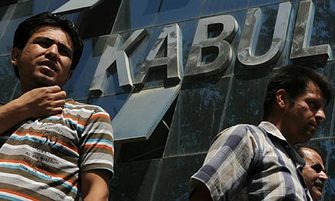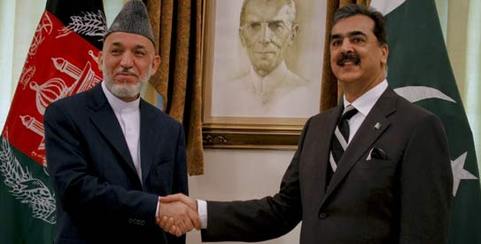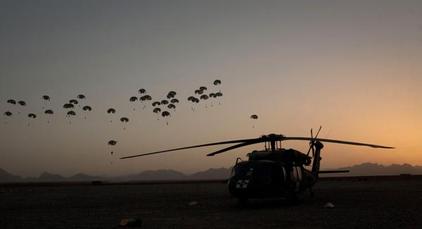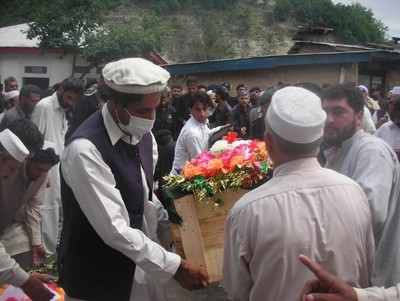IMF rejection of proposals over Kabul Bank crisis, $820m bailout debts and suspension of aid leaves country in deepening crisis

The Afghan government will struggle to pay its bills "within a month" after the International Monetary Fund rejected proposals for resolving the Kabul Bank scandal, western officials have warned.
Although the war-torn country's biggest bank nearly collapsed last September, the government of Hamid Karzai and the international community are still at loggerheads over plans to fund an $820m (£507m) bailout as well as how the disgraced former managers and shareholders who helped themselves to hundreds of millions of dollars should be prosecuted.
As long as the IMF declares the plans to be inadequate, many countries, including Britain, are legally barred from pumping money into a government that is almost completely reliant on foreign cash to pay civil servants' salaries.
It was reported by Reuters that the IMF has now formally rejected the Afghan government's proposals, meaning aid disbursements will remain on hold. The failure to reach a deal by a deadline of last Saturday also meant a $70m payment from the World Bank's Afghan reconstruction trust fund was automatically withheld.
Two senior western officials said the government will face a cash crisis in the coming weeks and could struggle to pay staff bills, although one predicted this would be avoided by cutting other spending priorities.
Last month, Omar Zakhilwal, the country's finance minister, told the Guardian that suspension of aid payments "has already had an effect on us, no doubt about it". He insisted that the Afghan government had done "95% of what was asked of us" by the IMF, including effectively nationalising Kabul Bank, stripping the shareholders of their rights and putting all unrecovered loans into receivership.
But although he claimed the remaining issues "were inconsequential to Kabul Bank" the IMF sees two aspects as vitally important. Firstly, an agreement that Afghan taxes, not foreign aid, will repay the $820m taken out of central bank reserves last year to prop up the bank. Second, they want serious criminal investigations against managers and shareholders, many of whom enjoy high level political support, who illegally borrowed huge sums of interest-free cash from the bank.
Although the finance ministry has drawn up plans to increase its tax-raising efforts in order to pay off the bailout in annual instalments, horrified MPs have already rejected one budget request for $73m and is also likely to reject a supplemental budget due to be presented by Zakhilwal soon.
"The IMF tells me, this is our demand, give me condition by this date the parliament must approve this line in the budget," explained Zakhilwal. "I am a minister, can I chose the parliament timeline? On these issues the international community totally disregards the legal processes of Afghanistan."
Many MPs argue that the money should be found by simply selling off the assets illegally bought by shareholders and managers, including a gas distribution company, an airline and luxury villas in Dubai.
Although a $10m forensic audit by Kroll may help identify many deliberately hidden assets, most western experts doubt more than half of the outstanding $910m will be recovered. So far just $61m has been retrieved.
Zakhilwal also argued that prosecutions could only be handled by the attorney general and warned that the complicated inquiry cannot be rushed.
"The attorney general can arrest people, but after 15 days with not case they have to be acquitted – that would be even more embarrassing for us," Zakhilwal said.
Although the finance minister insisted the attorney general was "absolutely committed" to a thorough investigation, the international community is sceptical, not least after Afghanistan's top law officer threw out a case last year against one of Karzai's key aides who had been wire-tapped soliciting a bribe.
One alternative plan is for a special court of handpicked judges deemed to be reasonably honest and well-versed in finance to hear the case.
Credible prosecutions are vital, not just to appease public anger, but also because many of Kabul Bank's assets are in Dubai. Under United Arab Emirates law it is impossible to seize properties until criminal investigations have begun.
Not only does Afghanistan face a cash crunch, the showdown with the IMF also threatens to derail plans, pushed hard by Hamid Karzai, for a far greater proportion of international aid to be spent through official channels, rather than on projects outside the control of the government.
A key element of the "transition" strategy by which the foreign intervention in Afghanistan will be greatly reduced by the end of 2014, the international community last year agreed that 50% of spending will go through the government by 2012.
But it is now feared that if the Afghan government continues to be considered unworthy of international investment by the IMF the country will have to return to patchwork of bilateral funding agreements.
Although the war-torn country's biggest bank nearly collapsed last September, the government of Hamid Karzai and the international community are still at loggerheads over plans to fund an $820m (£507m) bailout as well as how the disgraced former managers and shareholders who helped themselves to hundreds of millions of dollars should be prosecuted.
As long as the IMF declares the plans to be inadequate, many countries, including Britain, are legally barred from pumping money into a government that is almost completely reliant on foreign cash to pay civil servants' salaries.
It was reported by Reuters that the IMF has now formally rejected the Afghan government's proposals, meaning aid disbursements will remain on hold. The failure to reach a deal by a deadline of last Saturday also meant a $70m payment from the World Bank's Afghan reconstruction trust fund was automatically withheld.
Two senior western officials said the government will face a cash crisis in the coming weeks and could struggle to pay staff bills, although one predicted this would be avoided by cutting other spending priorities.
Last month, Omar Zakhilwal, the country's finance minister, told the Guardian that suspension of aid payments "has already had an effect on us, no doubt about it". He insisted that the Afghan government had done "95% of what was asked of us" by the IMF, including effectively nationalising Kabul Bank, stripping the shareholders of their rights and putting all unrecovered loans into receivership.
But although he claimed the remaining issues "were inconsequential to Kabul Bank" the IMF sees two aspects as vitally important. Firstly, an agreement that Afghan taxes, not foreign aid, will repay the $820m taken out of central bank reserves last year to prop up the bank. Second, they want serious criminal investigations against managers and shareholders, many of whom enjoy high level political support, who illegally borrowed huge sums of interest-free cash from the bank.
Although the finance ministry has drawn up plans to increase its tax-raising efforts in order to pay off the bailout in annual instalments, horrified MPs have already rejected one budget request for $73m and is also likely to reject a supplemental budget due to be presented by Zakhilwal soon.
"The IMF tells me, this is our demand, give me condition by this date the parliament must approve this line in the budget," explained Zakhilwal. "I am a minister, can I chose the parliament timeline? On these issues the international community totally disregards the legal processes of Afghanistan."
Many MPs argue that the money should be found by simply selling off the assets illegally bought by shareholders and managers, including a gas distribution company, an airline and luxury villas in Dubai.
Although a $10m forensic audit by Kroll may help identify many deliberately hidden assets, most western experts doubt more than half of the outstanding $910m will be recovered. So far just $61m has been retrieved.
Zakhilwal also argued that prosecutions could only be handled by the attorney general and warned that the complicated inquiry cannot be rushed.
"The attorney general can arrest people, but after 15 days with not case they have to be acquitted – that would be even more embarrassing for us," Zakhilwal said.
Although the finance minister insisted the attorney general was "absolutely committed" to a thorough investigation, the international community is sceptical, not least after Afghanistan's top law officer threw out a case last year against one of Karzai's key aides who had been wire-tapped soliciting a bribe.
One alternative plan is for a special court of handpicked judges deemed to be reasonably honest and well-versed in finance to hear the case.
Credible prosecutions are vital, not just to appease public anger, but also because many of Kabul Bank's assets are in Dubai. Under United Arab Emirates law it is impossible to seize properties until criminal investigations have begun.
Not only does Afghanistan face a cash crunch, the showdown with the IMF also threatens to derail plans, pushed hard by Hamid Karzai, for a far greater proportion of international aid to be spent through official channels, rather than on projects outside the control of the government.
A key element of the "transition" strategy by which the foreign intervention in Afghanistan will be greatly reduced by the end of 2014, the international community last year agreed that 50% of spending will go through the government by 2012.
But it is now feared that if the Afghan government continues to be considered unworthy of international investment by the IMF the country will have to return to patchwork of bilateral funding agreements.




 RSS Feed
RSS Feed